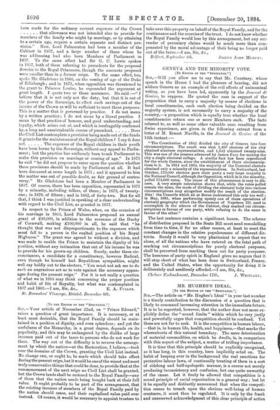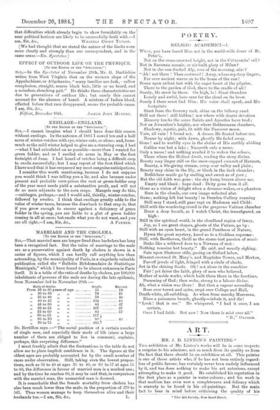MR. HUGHES'S IDEAL.
[To THE EDITOR OF THE " SPECTATOR:]
SIR,—The article on "Mr. Hughes's Ideal" in your last number is a timely contribution to the discussion of a question that is likely to command increasing attention in the immediate future. It is to be regretted, however, that the author does not more ex- plicitly define the "sound limits" within which he very justly and powerfully urges that competition should be confined. Yet these are not far to seek. It is the competition in human labour, —that is, in human life, health, and happiness,—that marks the whereabouts of this natural boundary. The mere deterioration of material commodities, on which he dwells, is, in comparison with this aspect of the subject, a matter of trifling importance.
It is time that this principle should be explicitly recognised, as it has long, in this country, been implicitly acted on. The habit of keeping ever in the background the real sanctions for protective labour laws, of continually treating of them in a sort of sidelong and half-apologetic manner, is a course not merely producing inconsistency and confusion, but one quite unworthy of the cause. Let it freely be allowed that competition is a sound principle of social organisation in a general way; but let it be equally and distinctly announced that when the competi- tion comes to trench upon the obvious well-being of human creatures, it must then be regulated. It is only by the frank and unreserved acknowledgment of this clear principle of action
that difficulties which already begin to show formidably on the near political horizon are likely to be successfully dealt with.—I
am, Sir, Stc., WHATELY COOKE TAYLOR. [We had thought that we stated the nature of the limits even more clearly and strongly than our correspondent, and in the same sense.—En. Spectator.]







































 Previous page
Previous page